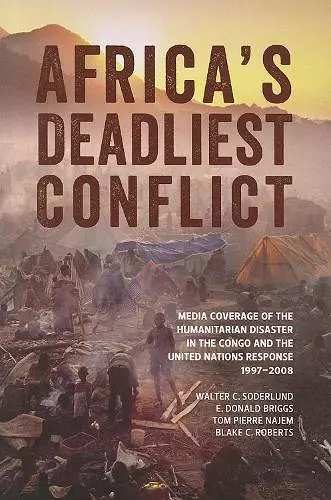Africa's Deadliest Conflict
Media Coverage of the Humanitarian Disaster in the Congo and the United Nations Response, 1997-2008
Walter C Soderlund author Tom Pierre Najem author E Donald Briggs author Blake C Roberts author
Format:Paperback
Publisher:Wilfrid Laurier University Press
Published:30th Aug '12
Should be back in stock very soon

Africa's Deadliest Conflict deals with the complex intersection of the legacy of post-colonial history - a humanitarian crisis of epic proportions - and changing norms of international intervention associated with the idea of human security and the responsibility to protect (R2P). It attempts to explain why, despite a softening of norms related to the sanctity of state sovereignty, the international community dealt so ineffectively with a brutal conflict in the Democratic Republic of the Congo, which between 1997 and 2011 claimed an estimated 5.5 million. In particular, the book focuses on the role of mass media in creating a will to intervene, a role considered by many to be the key to prodding a reluctant international community to action.
Included in the book are a primer on Congolese history, a review of United Nations peacekeeping missions in the Congo, and a detailed examination of both US television news and New York Times coverage of the Congo from 1997 through 2008. Separate conclusions are offered with respect to peacekeeping in the Age of R2P and on the role of mass media in both promoting and inhibiting robust international responses to large-scale humanitarian crises.
"Scholars and faculty as well as peace practitioners in the fields of international security, international organizations, international social work, and social welfare policy will find Africa's Deadliest Conflict a vital addition to the literature on collective violence prevention and intervention research." -- Kingsley Chigbu, University of Texas -- ACUNS, 201309
"Africa's Deadliest Conflict is an impressive book that attempts to document the amount of US media coverage of wars in the Democratic Republic of Congo (DRC), from May 1997 to late 2008, using the concepts of agenda setting (media's evaluative function). If agenda setting can alert citizens and their leaders about faraway international events, framing makes them think about these events in a certain way. The authors use quantitative data to document the media's alerting function and qualitative data to address the evaluative function of both television and print news.... A thoughtful and insightful analysis of Congo's recent wars, making the book an excellent resource for students of mass media. Moreover, this book is a rich analysis and a worthwhile read for anyone interested in gaining a deeper understanding of not only Congo but the mass media's role in the political process." -- Emizet Kisangani, Kansas State University -- Modern African Studies, Volume 51/4, 201312
ISBN: 9781554588350
Dimensions: 229mm x 152mm x 25mm
Weight: 400g
275 pages